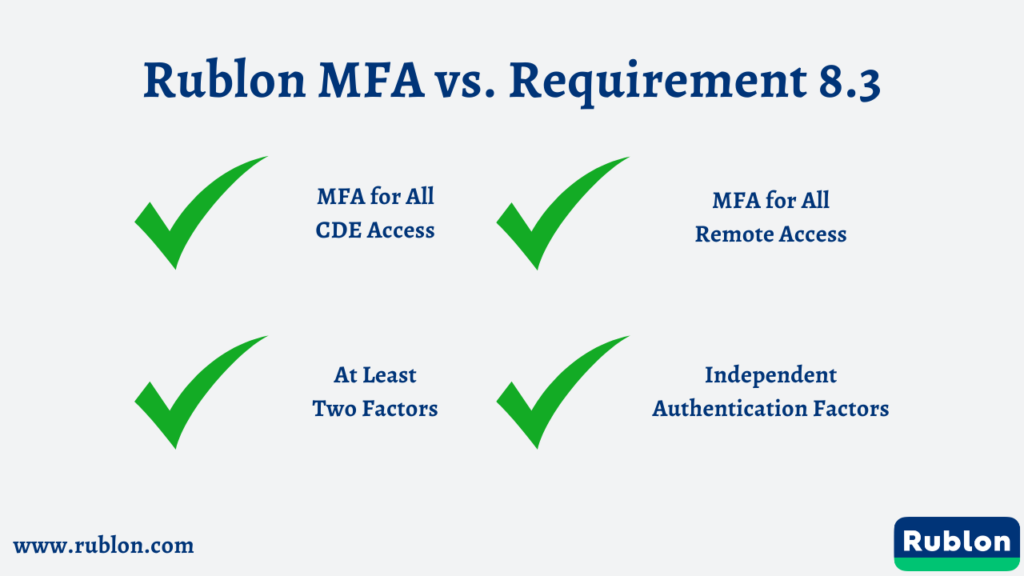The Payment Card Industry Data Security Standard (PCI DSS) version 3.2 underscores the need to secure financial systems by emphasizing robust authentication mechanisms. Specifically, Requirement 8.3 mandates the use of multi-factor authentication (MFA) to secure access to Cardholder Data Environments (CDE). In this article, we’ll explore how Rublon MFA aligns with PCI DSS 3.2’s Requirement 8.3, providing organizations with a comprehensive MFA solution.
What is PCI DSS 3.2’s Requirement 8.3?
PCI DSS Requirement 8.3:
“Secure all individual non-console administrative access and all remote access to the CDE using multi-factor authentication.
Note: Multi-factor authentication requires that a minimum of two of the three authentication methods be used for authentication. Using one factor twice (for example, using two separate passwords) is not considered multi-factor authentication.”
This requirement also includes two sub-requirements:
- Requirement 8.3.1: “Incorporate multi-factor authentication for all non-console access into the CDE for personnel with administrative access.”
- Requirement 8.3.2: “Incorporate multi-factor authentication for all remote network access (both user and administrator, and including third-party access for support or maintenance) originating from outside the entity’s network.”
Understanding the Importance of Requirement 8.3
Requirement 8.3 aims to ensure that individuals attempting to access the CDE are indeed who they claim to be. By requiring at least two independent authentication factors, the PCI DSS standard significantly reduces the risk of unauthorized access—even if one factor becomes compromised.
How Rublon MFA Ensures Compliance with Requirement 8.3

Rublon MFA is designed to meet and exceed the stipulations of PCI DSS 3.2’s Requirement 8.3. Here’s how Rublon MFA satisfies each requirement:
| PCI DSS 3.2 Requirement | How Rublon MFA Satisfies It |
| 8.3 Secure all individual non-console administrative access and all remote access to the CDE using multi-factor authentication. | Rublon MFA provides robust multi-factor authentication methods, ensuring that all non-console administrative and remote access to the CDE is secured with at least two independent authentication factors from different categories. |
| 8.3.1 Incorporate multi-factor authentication for all non-console access into the CDE for personnel with administrative access. | Rublon MFA enforces MFA for all non-console administrative access, utilizing methods like passwords combined with Mobile Push notifications or FIDO2 passkeys. This aligns with the requirement’s intent to protect administrative access points, which are often targeted by attackers. |
| 8.3.2 Incorporate multi-factor authentication for all remote network access (both user and administrator, and including third-party access for support or maintenance) originating from outside the entity’s network. | Rublon MFA secures all remote network access by requiring MFA for both users and administrators, including third-party vendors. By enforcing MFA for remote access originating from outside the organization’s network, Rublon MFA mitigates risks associated with remote access vulnerabilities and unauthorized external access. |
At Least Two Authentication Factors
PCI DSS 3.2 stipulates that multi-factor authentication requires an individual to present a minimum of two separate authentication factors before access is granted. This accurately describes multi-factor authentication, a standard that Rublon MFA, as an MFA platform, fully meets. Rublon’s multi-factor authentication (MFA) enhances security by ensuring that the person trying to access a system is indeed who they claim to be. By requiring multiple forms of verification, Rublon MFA makes it significantly harder for attackers to gain unauthorized access, as they would need to breach at least two separate authentication methods. This added complexity helps to lower the risk of compromise.
Network- and Application-Level MFA
PCI DSS 3.2 Requirement 8.3 says that “Multi-factor authentication is not required at both the system-level and application-level for a particular system component.“. Rublon MFA does not enforce such a setup but allows such a setup if necessary, giving the organization full flexibility in this matter. For example, Rublon MFA allows the organization to enable MFA both for the VPN connection to the corporate network and also to access a specific application that is only accessible within the corporate network.

The Importance of Compliance with PCI DSS 3.2’s Requirement 8.3
Meeting PCI DSS 3.2’s Requirement 8.3 is crucial for organizations handling payment card data. Non-compliance can result in significant financial penalties and damage to an organization’s reputation. Implementing Rublon MFA helps organizations achieve compliance and strengthen their overall security posture.
PCI DSS 3.2 vs. PCI DSS 4.0
In March 2022, the PCI Security Standards Council released PCI DSS version 4.0. This new version replaces PCI DSS 3.2.1. Organizations were expected to transition to PCI DSS 4.0 by March 31, 2024. Despite the new standard, some organizations continue to use the PCI DSS 3.2.1 standard for their internal needs due to existing compliance cycles or specific customer requirements.
Rublon MFA complies with both PCI DSS 3.2.1 and PCI DSS 4.0, ensuring your organization remains compliant regardless of the PCI DSS standard version. By supporting both versions, Rublon MFA offers the flexibility to meet current compliance obligations and prepares the organization for future requirements.
Start Your Free 30-Day Trial of Rublon MFA Today
Enhance your organization’s security effortlessly with Rublon MFA. Protect your applications, VPNs, and remote access points from unauthorized access with our user-friendly, robust multi-factor authentication solution.
Experience the full capabilities of Rublon MFA with our Free 30-Day Trial—no commitment required. See how Rublon MFA seamlessly integrates into your existing systems, providing stronger security for your employees.
Take the first step toward enhanced security today!
Conclusion
Protecting access to your organization’s resources goes beyond mere compliance; it’s about ensuring real security against ever-present cyber threats. PCI DSS 3.2’s Requirement 8.3 sets high standards, but Rublon MFA makes meeting these standards straightforward. By choosing Rublon MFA, you are safeguarding your data, earning customer trust, and gaining peace of mind knowing your organization adheres to the highest industry standards.